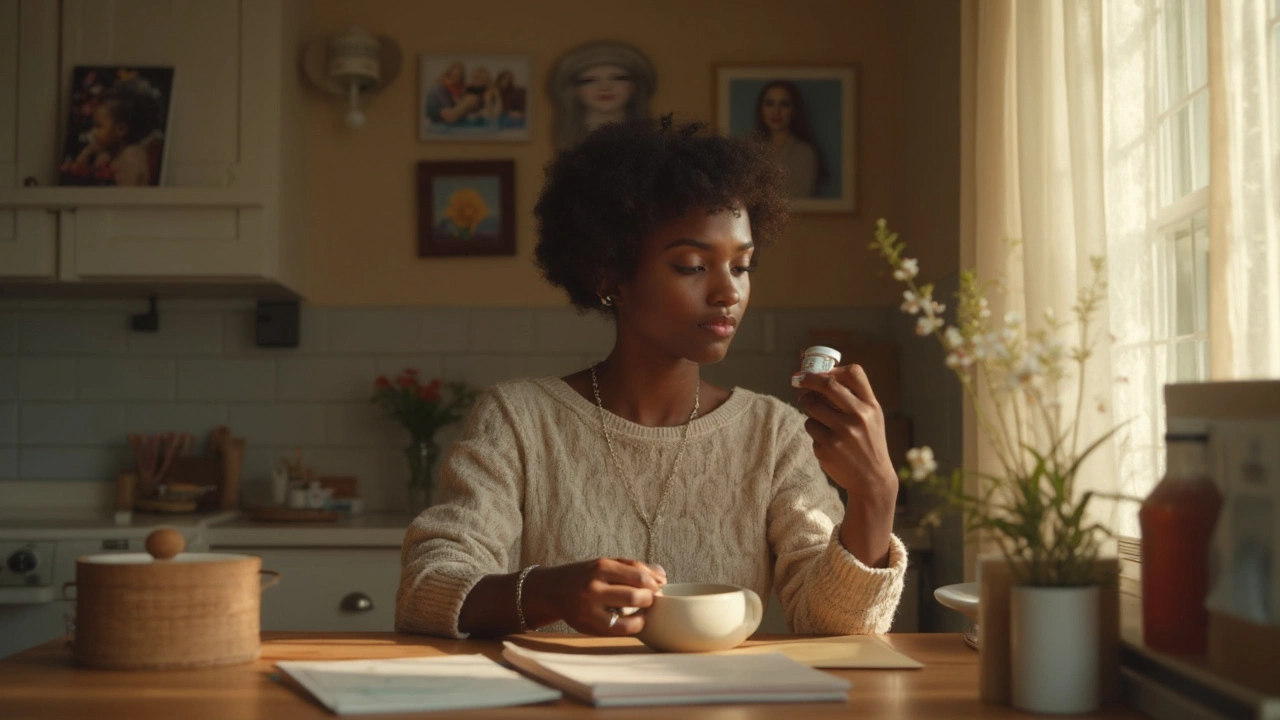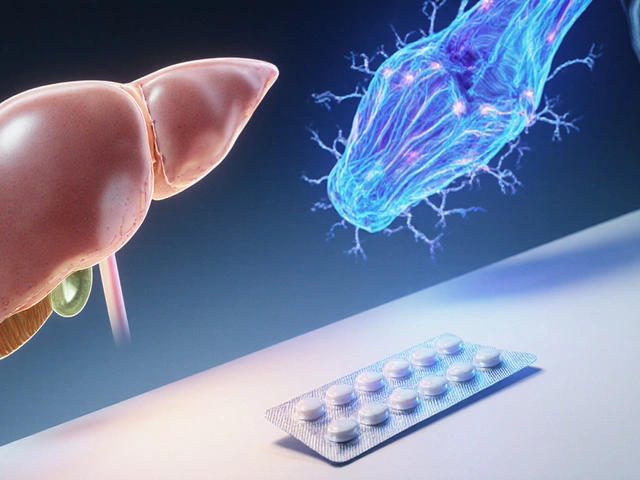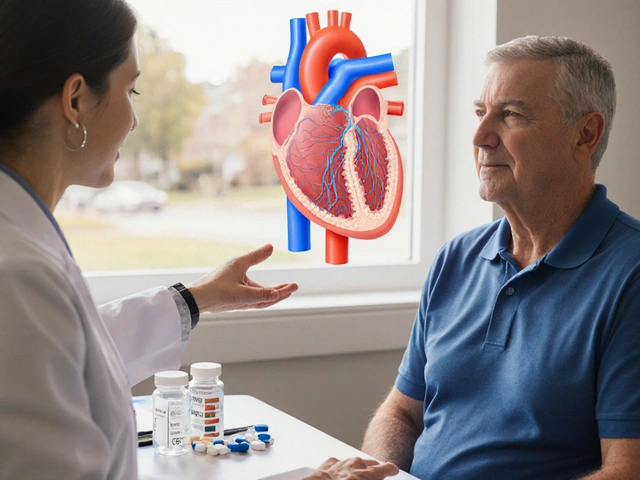Picture this: a medication so famous it’s practically a household name, often whispered by friends, prescribed by doctors, and hotly debated at dinner tables. Prozac isn’t just another pill; it’s practically a cultural phenomenon. But how did one small capsule land in so many medicine cabinets, and what does it actually do for those who take it every morning with their coffee? There are plenty of stories and misconceptions. Is it a magic bullet for depression, or just another pharmaceutical crutch? Time to get real about what Prozac is—and what it’s not.
How Prozac Works: The Science Behind the Capsule
Prozac, or as pharmacists call it, fluoxetine, burst onto the mental health scene in 1987. Before Prozac, antidepressants tended to make people sleepy, dizzy, and endlessly hungry. Fluoxetine flipped the narrative. It was marketed as a selective serotonin reuptake inhibitor (SSRI), which just means it helps keep more of the happy brain chemical—serotonin—floating around between your neurons. The whole idea is to help improve mood by making sure serotonin doesn’t get sucked back into the nerve cells too quickly. It’s like making sure a party doesn’t end too soon because someone keeps taking away all the snacks.
The real breakthrough with Prozac was how different it felt from the older drugs, called tricyclic antidepressants and MAOIs. Those came with a list of side effects so long it made people think twice before taking them. Prozac, by comparison, was billed as easier to tolerate and safer if you happened to take more than you should. In fact, within two years of Prozac’s launch, doctors in the U.S. were writing more than two million prescriptions for it every month. As of 2024, it remains on the World Health Organization’s list of essential medicines.
One clinical trial published in 2018 followed 522 people with major depression over three months. It found 54% of those on fluoxetine had their symptoms cut in half, compared to only 38% for those on placebo. That’s not small potatoes. But—and here’s the kicker—about a third of people don’t respond at all. For them, Prozac might as well be a sugar pill. No one completely understands why antidepressants work for some brains and not for others, but there’s growing interest around genes, gut bacteria, and environment playing bigger roles than we once thought.
When someone starts Prozac, it doesn’t act instantly. You can feel pretty impatient during the first few weeks. Some people report a bit more energy before they notice any real mood change, which can be both a blessing and a curse—especially for those with serious depression. That extra energy, partnered with low mood, makes careful monitoring key in the early treatment weeks. Here’s what’s wild: Prozac is sometimes given for conditions you may not expect—like obsessive compulsive disorder, bulimia, and even some types of chronic pain. It’s all about the way serotonin zips around in the nervous system.
The modern Prozac capsule usually comes in 10, 20, or 40 milligrams. Dosing is usually slow and gradual: doctors tend to "start low and go slow" to help the body adjust and minimize side effects. Here’s a quick look at the most typical starting dosages for adults:
| Condition | Usual Starting Dose | Max Daily Dose |
|---|---|---|
| Depression | 20mg | 80mg |
| OCD | 20mg | 60mg |
| Bulimia | 60mg | 60mg |
All this science aside, the day-to-day experience of taking Prozac is what most people care about. There’s no blood test to predict response, and only someone who’s lived through the first few months can tell you how weird (and sometimes wonderful) the adjustment period can be.

The Realities of Taking Prozac: Benefits, Side Effects, and Surprises
Ask anyone who’s been on Prozac longer than a month, and they’ll probably tell you it’s a mixed bag. The first thing most folks notice, if anything, is a slight jittery feeling—like drinking a bit too much coffee. During those first two weeks, it’s not uncommon to feel a bit more anxious or restless. Some get headaches, a whiff of nausea, or just odd sleep. The thing is, most of these symptoms tend to fade by the end of the first month. One useful trick: take your dose in the morning to avoid insomnia, since Prozac can pack a wakefulness punch.
Now, about those side effects. The most common ones aren’t exactly fun dinner conversation, but here’s the honest truth:
- Digestive stuff: nausea, diarrhea, or dry mouth
- Sexual issues: lower libido, delayed orgasm, or trouble maintaining arousal (this can be the dealbreaker for many)
- Changes in sleep, either trouble falling asleep or feeling drowsy during the day
- Sweating, weird dreams, even weight loss for some
One thing that makes Prozac stand out from other antidepressants is its really long half-life. That just means it stays in your system a while, even if you miss a dose or two. If you forget a pill, it’s not usually a disaster. And if you ever need or want to stop, Prozac has a lower risk for withdrawal symptoms compared to many other SSRIs. Still, always check with your doctor first. An abrupt stop can lead to what’s sometimes called "discontinuation syndrome," with symptoms like dizziness, electric zap sensations, or weird mood swings. Not fun.
For some, Prozac is a lifesaver. It gently lifts the fog, making life’s challenges easier to face. Others describe a "flattening" of emotions—a sort of emotional muffling, where you’re less sad but also less excited or passionate. This can lead people to wonder if it’s worth trading feeling down for feeling, well, less of anything. If you start noticing this, talk with your prescriber. Sometimes a lower dose or a different SSRI can make a difference.
The risk of serious side effects—like serotonin syndrome, which is when there’s way too much serotonin—is rare but real. Signs to watch for are confusion, rapid heartbeat, shivering, or muscle rigidity, especially if you’re taking other meds that increase serotonin. Always keep a current list of your medications and share it with every healthcare provider—not just your shrink. Interactions are sneaky, and several over-the-counter meds and even some supplements can boost serotonin.
Here are some tips from actual Prozac veterans and mental health pros:
- Stick with it, unless side effects are unbearable. Most people see the full benefits after 4-8 weeks.
- If sexual side effects hit hard, ask about "drug holidays" (with a prescriber’s OK) or newer meds with a lower risk for these effects.
- Track your mood and symptoms—apps like MoodKit or just good old journaling can help spot patterns you didn’t expect.
- Don’t mix Prozac with alcohol or street drugs. The combination can lower its effectiveness and raise danger for side effects.
- If you’re pregnant, talk with both your psychiatrist and OB-GYN. Data suggests the risks are low, but each case is different.
It’s easy to feel alone when you’re struggling with medication changes or mental health shifts. But millions are right there with you. As Dr. Kay Redfield Jamison, author and professor of psychiatry at Johns Hopkins, puts it:
"We have to live at the intersection of science and soul. Medication is just one tool in the mental health toolkit, not a cure-all."
By the way, don’t fall for the idea that Prozac (or any med) will "change your personality" or turn you into someone you’re not. That’s not how SSRIs work. But they can make it easier to get out of bed, go to work, connect with friends—and just be yourself again.
So what about the numbers? A nationwide survey in the US from 2023 found that about 12% of adults have taken some form of antidepressant in the past year, with Prozac being one of the most common. For adolescents, it’s often the first SSRI considered because of its well-documented safety record in young people. It’s also the only antidepressant approved by the FDA for children as young as eight with depression and for obsessive-compulsive disorder.

Beyond the Pill: Myths, Missteps, and Daily Life on Prozac
There’s more gossip about Prozac than most celebrities get in a month. Let’s bust some myths and talk real-life stuff you won’t hear in the pharmacy.
- Prozac isn’t addictive. You won’t get cravings or highs. People confuse "dependence" (your brain missing its daily dose) with "addiction" (needing more to get the same effect). That doesn’t happen with SSRIs.
- No, it doesn’t make you a "zombie." If you feel super dull or out of it, your dose may be off or it’s just not your med. Time for a conversation with your doctor.
- You do NOT have to be on Prozac forever. Plenty of people use it just for a season—six months to a year after feeling better—and then taper off successfully. Others stick with it for years to prevent relapses. The timeline is different for everyone.
Now, let’s talk money and access. Prozac went off patent ages ago, so the generic, fluoxetine, is cheap and covered by most insurance. In the US, a month’s supply often costs less than a couple of lattes. That’s a big deal for folks juggling high healthcare bills.
Stigma still hangs around antidepressants—even in 2025. "You’re just taking Prozac because you can’t handle life," people mutter. That’s nonsense. Depression and anxiety aren’t character flaws. The science is clear: they’re complex conditions with physical and emotional roots. If you broke your leg, would you skip the cast just to tough it out? Same logic. Sadly, this stigma can keep people from getting the help they need or make them stop meds too soon. Community support, therapy, and just talking about mental health openly are all changing that, bit by bit.
Some people love documenting their experiences on social media or through blogs to fight misinformation and show the human side of taking meds. If you’re thinking about Prozac, find online support groups or local meetups—just make sure to take medical "advice" with a grain of salt and always check with your doc before changing anything.
Besides medication, lifestyle tweaks make a huge difference. Try pairing Prozac with regular movement—a brisk walk, yoga, or dancing around the kitchen. Add decent sleep, less caffeine, and basic self-care (trust me, hydration works wonders). These small changes can deepen the benefits of an antidepressant and smooth out some side effects.
Let’s face it: Prozac isn’t magic. But for lots of people, it’s a step toward feeling calmer, more balanced, and more engaged with life. Whether you’re just starting, thinking about a switch, or wondering if it’s worth it to keep going, knowing the real story—good, bad, and in-between—matters. If you ever feel stuck, reach out. You’re not alone, and you’ve got tons of options.








Nicholas Blackburn
July 17, 2025 AT 22:17Alright, let me just say it straight — Prozac isn’t some magical cure-all that everyone dreams about. People get prescribed it like candy these days, but half of them don’t even understand what it’s doing inside their brains. From my experience, and I ain’t sugarcoating this, the side effects can be a nightmare that no one warns you about enough.
You want the honest truth? It’s a rollercoaster. Some days you feel like a zombie, other days slightly better, and sometimes the pills make you feel like a stranger in your own skin. The article's got some good points though — busting myths is necessary. But seriously, people take this stuff and expect magic; it's not a pill for happiness, it's for managing symptoms.
Also, the whole 'science says...' thing needs to be taken with a pinch of salt. Clinical trials are often in controlled environments and don’t represent real life. I think anyone thinking of starting Prozac really needs to dig deeper, maybe talk with someone who’s been through the wringer with it too. It’s not all sunshine and rainbows.
Dave Barnes
July 20, 2025 AT 10:26Philosophically speaking, the entire notion of Prozac challenges the modern quest for equilibrium in the chaotic states of human mind and spirit. I’m fascinated by how a chemical can sway the balance of moods and thoughts, turning the tumult into something relatively manageable.
But, of course, it’s a mixed bag, because the mind is not a machine, and we cannot simply reprogram it like a computer. Sometimes these drugs appear as the very embodiment of human hubris, attempting to tame chaos with synthetic peace.
Yet, if used wisely and under guidance, it’s a powerful force for good. We just need to ask more nuanced questions about the mind's relation to medicine, about what really constitutes 'normal' and 'healthy,' and how much of that is socially constructed.
Kai Röder
July 21, 2025 AT 14:13This article seems like a valuable resource for those who are cautious or curious about starting Prozac. It's essential to break down the stigma and lay out the facts with sensitivity and clarity, which I appreciate here.
From what I’ve seen, many people benefit from Prozac under professional supervision, and their quality of life improves significantly. That said, the article rightly emphasizes the importance of understanding potential risks, side effects, and individual response variability.
Open conversation and education about antidepressants like Prozac not only empower patients but also foster empathetic support from the community, which is crucial in mental health journeys.
Would anyone here share experience on managing expectations realistically while on Prozac?
Brandi Thompson
July 22, 2025 AT 04:06Honestly, the whole celebrity-ized reputation of Prozac irritates me endlessly. Everyone acts like popping a Prozac pill is gonna sort their lifelong anguish overnight. It’s aggravating because it glosses over the gritty, often ugly reality of persistent mental health struggles.
What no one talks enough about is the fatigue, emotional numbness, and sometimes the way it feels like social and personal identity get diluted. It’s not just a label for depression anymore — it’s been transformed into this glossy mental health panacea that ignores the messy individuality of treatment responses.
I’m skeptical of the hype and wish articles like this one dug even deeper into the emotional costs as much as the scientific benefits. Let’s get real, mental health treatment is never this straightforward.
Chip Hutchison
July 26, 2025 AT 05:20I think this article is a great step towards opening up honest conversations about Prozac. From my own learning and listening to people on this med, it’s clear that the experience is incredibly personal.
Some find it life-changing and helping them reclaim their daily joy; others struggle with side effects or partial relief. The truth is, mental health treatment isn’t a one-size-fits-all scenario. What helped me was combining medication under professional care with community support and healthy routines.
How people manage expectations is crucial — that’s where patience and empathy come in. It’s good to see content that grounds us in facts while addressing myths.
Emily Moody
July 29, 2025 AT 16:40Prozac, that pill wrapped in patriotic fervor as an American miracle? I couldn’t find that article bold enough. The pharmaceutical-industrial complex has sold us a ton of snake oil disguised as progress. I mean, come on, do we really trust this chemical shotgun approach to the delicate psyche?
This nation's obsession with quick-fix solutions for mental health issues is both poetic and tragic — super dramatic but tragically lacking critical reflection. ‘Risks and benefits’ conveniently omits the emotional and cultural casualties, the stories of dependence and subtle conformity to pharmaceutical capitalism.
We need more than surface-level cheerleading for meds, we need rigorous dialogues about societal values, the structural roots of despair, and the real meaning of wellness that goes beyond pill bottles.
Prateek Kohli
August 3, 2025 AT 07:46Hey folks, coming from India, I’ve seen Prozac being prescribed quite often too, and I feel like experiences vary immensely based on culture and support systems around the patient.
What struck me most is how essential it is to combine medication with a nurturing environment and compassionate care. Embracing the medication isn’t just a physical act, but also psychological and social.
Articles like this help to bridge the gap between science and real life, showing that it’s not just about symptoms but also quality of life and personal acceptance. 🙂
I'm curious how others feel about the social perception of antidepressant use in their regions?
Noah Seidman
August 7, 2025 AT 22:53Honestly, the whole Prozac conversation is riddled with half-truths and pseudo-intellectual nonsense — I’m here to cut through that. People want to believe a pill will magically fix deep-seated issues but neglect that it’s a band-aid, not a cure.
Medication can be helpful, sure, but it requires discipline, lifestyle changes, and confronting hard realities — not passively expecting happiness in pill form. The article's tips are commendable but understate the personal accountability involved.
Still, I reckon we need more brutal honesty about mental health meds. It’s a complex subject, often romanticized or demonized unjustly.
Anastasia Petryankina
August 10, 2025 AT 06:26Oh great, yet another article pandering to the unwashed masses with overly simplistic takes on Prozac. Spare me the usual medical jargon dressed up as enlightening prose.
The truth is more banal yet significantly more ironic — Prozac is a cult drug, worshipped and vilified in equal measure by the uninformed and the affected. But let’s not pretend it’s either panacea or poison. It’s a blunt instrument masquerading as a scalpel. And frankly, the cultural obsession with antidepressants is just peak contemporary absurdity.
Anyone expecting profound revelations here is going to be severely underwhelmed.
Tim Ferguson
August 12, 2025 AT 14:00It’s funny how everyone’s so quick to jump to extremes about Prozac without acknowledging that it’s just another tool — nothing more, nothing less. If you think it’s a miracle drug, great, but if you expect it to solve all problems, you’re setting yourself up for disappointment.
The article is decent, gives a balanced view, but people still miss the point that medication effectiveness also depends on mindset, environment, and complementary support. Just taking a pill isn’t the endgame.
Maybe if folks thought more critically and less emotionally, they’d understand that mental health is complicated and demands a holistic approach.
Noah Cokelaere
August 16, 2025 AT 01:20So many clichés get thrown around Prozac discussions that it’s refreshing to see honest scientific facts coupled with real-world tips in this article. It’s not just about the chemical mechanism; it’s about how people cope and grow with the help of such meds.
I love that this article breaks down the myths, which is much needed given the toxic mix of stigma and misinformation.
From a chill perspective, it’s important to remember that medication is just one part of the bigger picture. Anyone considering Prozac should look at it as a step in a journey, not a destination. What do you all think about pairing meds with lifestyle changes and therapy?